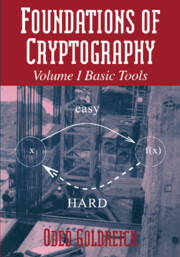2 - Computational Difficulty
Published online by Cambridge University Press: 10 December 2009
Summary
In this chapter we define and study one-way functions. One-way functions capture our notion of “useful” computational difficulty and serve as a basis for most of the results presented in this book. Loosely speaking, a one-way function is a function that is easy to evaluate but hard to invert (in an average-case sense). (See the illustration in Figure 2.1.) In particular, we define strong and weak one-way functions and prove that the existence of weak one-way functions implies the existence of strong ones. The proof provides a good example of a reducibility argument, which is a strong type of “reduction” used to establish most of the results in the area. Furthermore, the proof provides a simple example of a case where a computational statement is much harder to prove than its “information-theoretic analogue.”
In addition, we define hard-core predicates and prove that every one-way function has a hard-core predicate. Hard-core predicates will play an important role in almost all subsequent chapters (the chapter on signature scheme being the exception).
Organization. In Section 2.1 we motivate the definition of one-way functions by arguing informally that it is implicit in various natural cryptographic primitives. The basic definitions are given in Section 2.2, and in Section 2.3 we show that weak one-way functions can be used to construct strong ones. A more efficient construction (for certain restricted cases) is postponed to Section 2.6.
Information
- Type
- Chapter
- Information
- Foundations of Cryptography , pp. 30 - 100Publisher: Cambridge University PressPrint publication year: 2001
Accessibility standard: Unknown
Why this information is here
This section outlines the accessibility features of this content - including support for screen readers, full keyboard navigation and high-contrast display options. This may not be relevant for you.Accessibility Information
- 1
- Cited by
